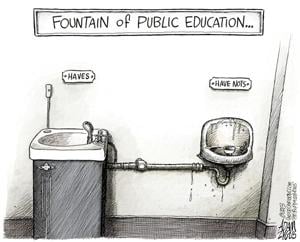MORE TROUBLING THAN VOUCHERS

BY JOHN THOMPSON
“For the life of me,” retiring Tulsa Superintendent Ballard said, “I cannot understand why … at a time when we’re talking about a huge [state revenue] shortfall, why are we shoveling money at private schools.”
Oklahoma is projecting a $611 million reduction in general revenue for the fiscal year that begins July 1, yet the state Senate is considering a voucher bill – SB 609 – that would take tax dollars from public schools and allow them to be spent on private or home schooling.
“This is going to have a disastrous affect on public schools,” added Ballard. “In Tulsa Public Schools alone, the first 500 kids alone that go to a private school are going to take $1 million out of Tulsa Public and move it over to private schools.”
I oppose vouchers, but I’m much more worried about SB 68, which would allow the city governments of Oklahoma City and Tulsa to authorize charter schools [see Editor’s Note below]. The costs of vouchers are primarily monetary, issuing checks to many persons who would never attend public schools, or subsidizing others who then choose private schools.
Classroom seats emptied because of charters, however, would be just as empty as those that lost students to vouchers. And while the costs of vouchers would be spread across the state, the damage done by SB 68 would primarily be born by the poorest children of color in the inner cities.
SB 68 is an extreme version of choice that grew out of the claim by market-driven reformers that local school boards, teachers’ unions, and university education departments – i.e. the “status quo” – must be destroyed so that “disruptive innovation” can transform schools.
In Oklahoma City, it could eventually become a mortal threat to the school system, as well as its teachers’ union.
If the majority of the City Council gains the power to compete with the Oklahoma City Public Schools, SB 68 would allow them to set their own rules in doing so. Oklahoma City could then join the growing ranks of communities where traditional public schools are extinct or nearly all replaced by charters, including “virtual learning” online charters.
If corporate leaders decided that their lives would be easier without unions, especially public service unions, they could use all of the advantages granted to charters to break the OKC AFT.
As a member of the MAPS for KIDS bipartisan reform coalition, I supported charter schools. I still do, even as I mourn the way that the original version of choice has been undermined.
Back then, charters were seen as a source of innovation. [Oklahoma City’s ASTEC and Stanley Hupfield Academy are examples of the type of outstanding 1990s charters that sought holistic instruction, not just drill and kill.] Since the No Child Left Behind Act of 2001, charters have become a competitive force that, all-to-often, embraced teach-to-the-test shortcuts in an effort to defeat neighborhood schools.
Worse, due to their focus on outperforming traditional public schools, charters have resorted more and More Troubling Than Vouchers | Oklahoma Observer:
